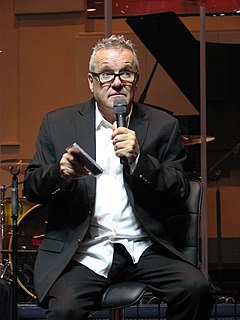A Quote by John Shelby Spong
I think one of the things we've got to look out for is human beings claiming that they know how God operates.
Quote Topics
Related Quotes
And people who believe in God think God has put human beings on earth because they think human beings are the best animal, but human beings are just an animal and they will evolve into another animal, and that animal will be cleverer and it will put human beings into a zoo, like we put chimpanzees and gorillas into a zoo. Or human beings will all catch a disease and die out or they will make too much pollution and kill themselves, and then there will only be insects in the world and they will be the best animal.
Salvation is a word for the divine spaciousness that comes to human beings in all the tight places where their lives are at risk, regardless of how they got there or whether they know God's name. Sometimes it comes as an extended human hand and sometimes as a bolt from the blue, but either way it opens a door in what looked for all the world like a wall. This is the way of life, and God alone knows how it works.
There are novels that end well, but in between there are human beings acting like human beings. And human beings are not perfect. All of the motives a human being may have, which are mixed, that's the novelists' materials. That's where they have to go. And a lot of that just isn't pretty. We like to think of ourselves as really, really good people. But look in the mirror. Really look. Look at your own mixed motives. And then multiply that.
At a certain point we need to grow up; we need to look inside ourselves for our inner guidance. There are things most human beings know; they just don't want to know them. They know deep down that certain things in their lives are working or aren't working, that certain parts of their lives are functional and others are dysfunctional. But sometimes, as human beings, we don't want to know what's not convenient. So we pretend not to know.
It's easy to sell good news like this, and the authors confidently rely on classic fallacious arguments. They argue by declaration, which is what makes the books so amusing. In matter-of-fact, authoritative tones, the authors tell us how plants and human beings exchange energy - or they describe what angels look like, whether or how they're sexed, how they communicate with human beings, and how they differ from ghosts. Readers might be expected to wonder, How do they know?
A person is a person through other persons. None of us comes into the world fully formed. We would not know how to think, or walk, or speak, or behave as human beings unless we learned it from other human beings. We need other human beings in order to be human. I am because other people are. A person is entitled to a stable community life, and the first of these communities is the family.
If you read Calvin, for example, he says, How do we know that we are godlike, in the image of God? Well, look at how brilliant we are. Look how we can solve problems even dreaming, which I think is true, which I've done myself. So instead of having an externalized model of reality with an objective structure, it has a model of reality that is basically continuously renegotiated in human perception. I think that view of things is pretty pervasively influential in Protestant thought.
There is no limit to suffering human beings have been willing to inflict on others, no matter how innocent, no matter how young, and no matter how old. This fact must lead all reasonable human beings, that is, all human beings who take evidence seriously, to draw only one possible conclusion: Human nature is not basically good.
God is so much nicer than you can imagine. I know "nice" is an odd word, but He loved you enough to die for you. And if you think of a great parent, then you got a glimpse of God, a great father, a great mother, and how they look at their children. How you, if you're a parent, you look at your children.
God loves human beings. God loves the world. Not an ideal human, but human beings as they are; not an ideal world, but the real world. What we find repulsive in their opposition to God, what we shrink back from with pain and hostility, namely, real human beings, the real world, this is for God the ground of unfathomable love.
I think music is a lifting force, I think love is the lifting force in the human condition. I think you see someone loving on their child, and it moves you, and you can't help it. It rings a bell inside of us that elevates us as human beings, and I treasure that. I think it's one of the few great things about human beings.
People always ask, "How do you get in the mind of the teen reader?" I think all human beings have these common threads. We struggle with the same things. We desire love and attachment. We have to sort out how much we want to be attached and be independent, how we manage need and being needed and being hurt. These are things that begin when we're - how old? Then in those teen years we start to really feel them.
How Human beings are, that is how the society will be. So, creating human beings who are flexible and willing to look at everything rather than being stuck in their ideas and opinions definitely makes for a different kind of society. And the very energy that such human being carry will influence everything around them.






































